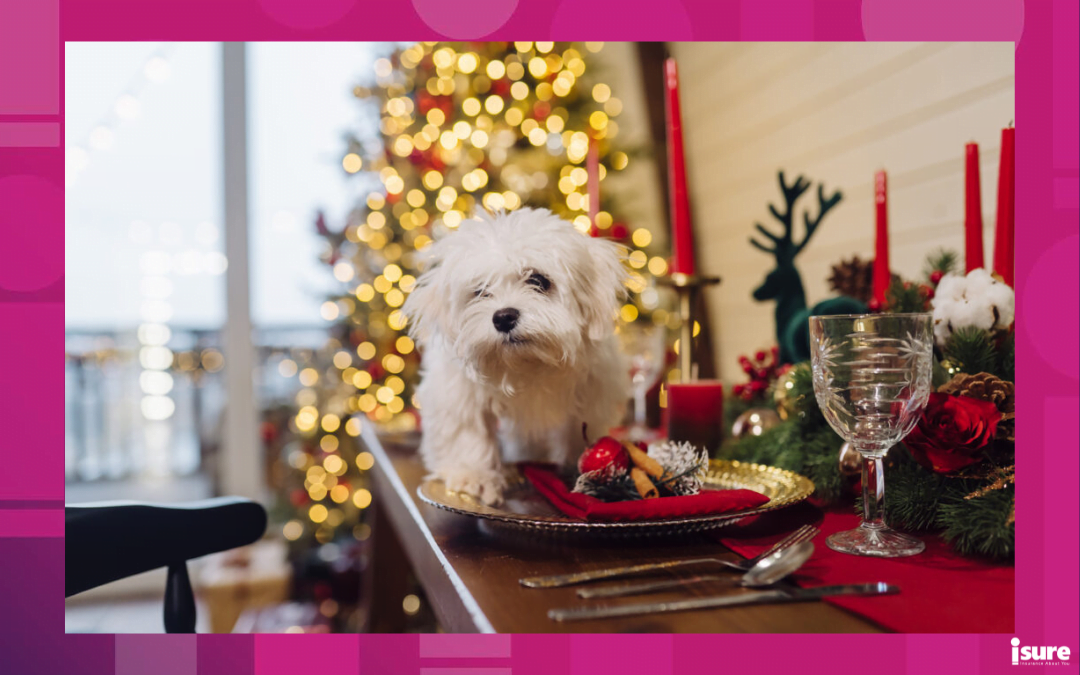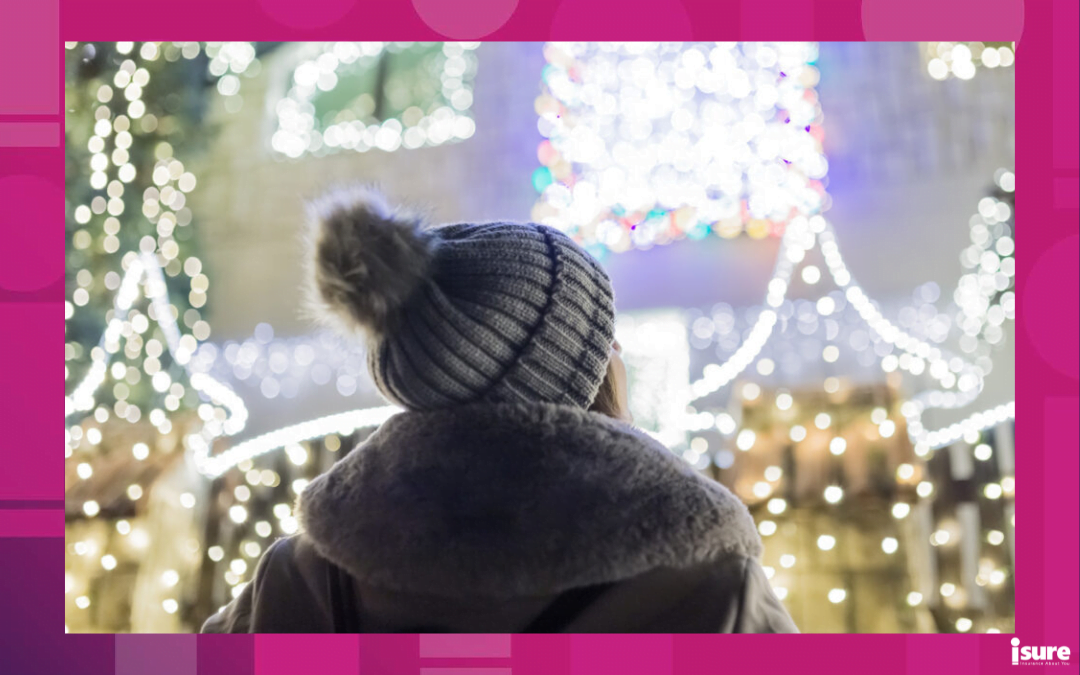While the holidays can bring a lot of festive cheer, they can also add a lot of hazards to the well-being of your pets. Whether it’s your treats that upset their stomachs, a tree whose needles wind up in their mouths or well-meaning relatives who feed them off the table, the happiest time of the year can quickly become the most dangerous time for our four-legged friends. Here’s what to know about some common holiday pet hazards, and how to keep your pets safe over the holidays so the season can be festive (and safe) for all.
Deck the halls safely
As recommended by the American Veterinary Medical Association, here are some safe decorating guidelines to keep in mind:
1. Prevent pets from accessing electrical cords
Animals may see an electrical cord as a chew toy. Electrical shock may occur when a pet chomps down on a cord, causing tongue lacerations and possible death. Where possible, run cords under furniture or cover them, and also check your holiday lights for signs of fraying or chewing. Use a grounded, three-prong extension cord as a safety precaution.
2. Place decorations carefully
Keep sharp and potentially dangerous decorations and ornaments out of reach for kids and pets. Look for shatterproof ornaments as an added precaution in case they fall off the tree.
3. Christmas trees and holiday greens
Make sure your dogs or cats do not chew on limbs or droppings from the tree. Ingested pine needles could get lodged in the intestinal tract, puncturing the lining or bunching together and causing an intestinal obstruction.
4. Beware of the tree’s water base
The water base of a (real) Christmas tree may contain dangerous chemicals that could harm your pet.
5. Christmas lights and tinsel
Position your tree’s lights and tinsel away from the bottom of the tree to keep your pets safe. Some pets climb up or into trees, and can even knock them over.
FYI: Tinsel is especially dangerous to cats, who might ingest them by accident while self-grooming or think those long silver strings are playthings. If not caught in time, this foreign body ingestion could be fatal as it twists and bunches inside your pet’s intestines. Immediate veterinary care is required!
6. Ribbons and bows
You may be tempted to dress your pet with a decorative ribbon “collar”, but beware that this could become a choking hazard. Also, it’s best to discard of ribbons and bows that your pet’s groomer may put on them so that your curious companions won’t be enticed to chew or swallow them.
Fire prevention for your pets
1. Candles
Don’t leave candles unattended. Pets may accidentally knock them over and spill wax or start a fire.
2. Firestarter logs
Dogs that enjoy chewing should steer clear of these logs because they contain sawdust and paraffin, which can cause an irritated stomach or even intestinal blockage when ingested.
3. Fireplace
Be sure that the fireplace screen is always in place to keep your pets safe.
Toxic holiday plants
They may be pretty, but some holiday plants are poisonous — even deadly. We recommend researching holiday plants before bringing them into your home — we’ve gathered a list of some common ones to be weary of:
- Pine needles: Can produce oral irritation, vomiting, diarrhea, lethargy, trembling, and posterior weakness.
- Holly: Commonly found during the Christmas season, can cause intense vomiting, diarrhea, and depression.
- Lily: A small, single leaf from any lily variety is lethal to cats.
- Mistletoe: Another Christmas plant that can cause significant vomiting and diarrhea, difficulty breathing, collapse, erratic behavior, hallucinations, and possibly death when ingested.
- Poinsettia: Though not deadly, it can irritate the mouth and stomach, as well as vomiting, if a large quantity has been consumed.
- Amaryllises: These contain noxious substances that can cause increased salivation, vomiting, diarrhea, decreased appetite and abdominal pain, lethargy, and tremors in both cats and dogs. The bulb of the plant is reputed to be more toxic than the flowers and stalk.
Holiday foods that can cause harm
To keep your pets safe from food hazards, keep them away from where food is being prepared and served — that includes the trash can, which cats and dogs can get into to dig out fatty scraps, raw meat, and bones.
Make sure your guests are tucking away potential pet hazards, especially if coats and purses are put into a room where the pet usually stays. Xylitol, which is an artificial sweetener often used in sugar-free gum, breath mints, mouthwash, and toothpaste, is toxic to dogs. Avoid giving pets table scraps during the holiday season unless you know the food is safe for them to eat.
Many common foods are poisonous to household animals:
- Alcoholic beverages
- Apple seeds
- Apricot pits
- Avocados and pits
- Bones (can splinter while chewed)
- Cherry pits
- Candy (particularly chocolate)
- Chives
- Coffee grounds or beans
- Fish (raw or undercooked)
- Garlic
- Grapes
- Gum
- Hops (used in home beer brewing)
- Macadamia nuts
- Meat (raw or undercooked)
- Mouldy foods
- Mushroom plants
- Mustard seeds
- Nuts
- Onions, onion powder and onion flakes
- Peach pits
- Potato leaves and stems
- Raisins
- Rhubarb leaves
- Salt
- Tea
- Tomato leaves and stems
- Walnuts
- Xylitol (artificial sweetener)
- Yeast dough
FYI: Pets who engage in trash-digging can accidentally eat foods that are potentially poisonous to them. Keep trash in tightly sealed containers or hidden somewhere your pet can’t access.
Practicing prevention is paramount to your pet’s well-being. Be sure to keep chemicals and cleaning products safely stored in locations where your curious critter won’t stumble upon them in their travels around your house. Also, be aware of any containers or packaging that may be leaking or dirty with the chemicals it contains to ensure your pet’s safety.
In case of emergency
During this busy time, it is impossible to keep an eye on your pets at all times. However, the following behaviors could point to a problem:
- Drooling
- Lip-licking
- Unusual pacing
- Difficulty getting into a comfortable position
- Vomiting or “just a retching posture and making the noise as if going to vomit” without anything coming out
Not sure if something is poisonous to your pet? Check the ASPCA website for more information on foods poisonous to pets. Write down the number for your veterinarian or pet hospital and store it in your phone, noting their holiday hours.
Welcomed guests with unwelcome behaviour
The best way to set expectations of how your family members should address your pets is to talk to them beforehand. That could be as simple as saying “Before you sit down, please do not feed our pet scraps from the table” or, if this has been a persistent problem at family meals before, have a phone conversation before the big day about how you intend to keep your pets safe.
Preparation is key
- Treats: Put treats in a jar marked especially for that pet. If someone wants to give the pet a treat, it has to come from that jar, not from whatever food is being prepared and fed to people.
- Flip the narrative: Instead of reprimanding a child who is too rough with your pet, talk to the parent about concerns for the child and the animal who they may injure.
- Designating a safe place: Whether that’s a room they like or a crate, get your pet used to that spot before the big day so it’s not a sudden change.
If you think it’s all going to be too much for your pet, boarding them or sending them to a verified pet sitter might not be a bad idea, either. As much as you want your pet to be part of the big day, their safety and happiness might be worth one night away from a situation that will stress them, harm them, or lead to a big vet bill.
Remember: Though the excitement of a party may overwhelm some pets, keep your pets inside during cold weather and provide plenty of toys to keep them busy.
When you leave the house
- Unplug decorations while you’re not around. Cats, dogs, and other pets are often tempted to chew electrical cords. Turning out the lights isn’t just about saving money, it’s about being safe. Always remember to turn off the outdoor (and indoor) Christmas lights before you head to bed. Now, if you enjoy a little more Christmas cheer, set your lights on a timer or get a smart plug that you can set on a schedule.
- Take out the trash to make sure your pets can’t get to it, especially if it contains any food or food scraps.
- Watch the exits. Even if your pets are comfortable around guests, make sure you watch them closely, especially when people are entering or leaving your home. While you’re welcoming hungry guests and collecting coats, a four-legged family member may make a break for it out the door and become lost.
- Identification tags and microchips reunite families. Make sure your pet has proper identification with your current contact information – particularly a microchip with up-to-date, registered information. That way, if they do sneak out, they’re more likely to be returned to you. If your pet isn’t already microchipped, talk to your veterinarian about the benefits of this simple procedure.
Pet insurance
Unfortunately, OHIP doesn’t cover medical care for your pet, so it’s important to plan for unexpected pet illnesses or accidents. Half of all pets will have a major illness in their lifetime, and veterinarians can now offer advanced treatments to help your pet recover from illness or injury. However, treatment can be costly, and veterinary bills can add up to several thousands of dollars or more. Pet insurance can help keep your pets safe and protect you from unexpected costs while providing the best veterinary care – ask your isure broker about this type of insurance!
While packages vary from company to company, there are three main insurance options available for your pet. Deductibles and percentage of cost coverage can often be adjusted to modify the cost of the plan.
Three main pet insurance options:
- Accident: Accident coverage will generally cover the cost of emergency veterinary care and treatment, up to a certain amount, for an unexpected accident, such as being hit by a car.
- Accident and illness: This offers the same accident coverage with the addition of illness insurance, which generally covers treatment for illnesses, hospitalization, surgery, and more.
- Preventive: Some companies have introduced plans that allow pet owners to pay flat monthly fees to cover regular care, such as vaccinations and annual exams.
- Additional options: Many companies offer add-on coverage that will cover additional costs, including rehabilitation, acupuncture, boarding fees, liability for third-party property damage, cremation or burial, and more.
It’s important to make an informed choice when purchasing pet health insurance that will keep your pets safe in an emergency. Make sure you understand how your insurance works and what’s covered before you have to make a claim. Discuss your pet insurance concerns with one of isure’s representatives to find out which insurance companies offer pet coverage.
The month of December teems with many types of holiday celebrations – from small family dinners to larger neighbourhood gatherings, nothing can spoil good cheer like an emergency trip to the veterinary clinic. Keep these tips in mind to keep the season jolly for both you and your pet!




